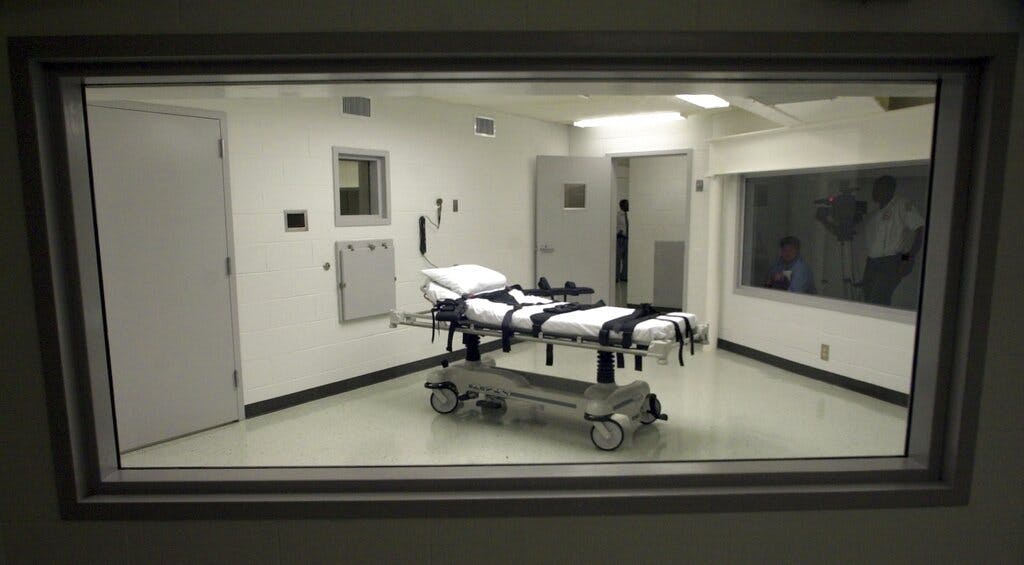Convicted Murderer Seeks Last-Minute Stay To Stop America’s First-Ever Execution by Nitrogen Gas
A federal court in Alabama will hear an appeal by inmate Kenneth Eugene Smith as his scheduled execution draws near.

Convicted murderer Kenneth Eugene Smith is making a last attempt at appealing his death sentence just a week before he is scheduled to be executed by a new, untested method called nitrogen hypoxia.
On Friday, the 11th Circuit Court of Appeals will hear oral arguments over the phone as Smith seeks a preliminary injunction to stop his scheduled January 25 execution, which the United Nations has warned could violate international human rights law. Last week, though, a federal judge in Alabama dismissed the request and gave the green light for America’s first-ever execution by nitrogen hypoxia.
The 58-year-old Smith was sentenced to death in 1988 when he was convicted of a murder-for-hire of Elizabeth Sennett at Jefferson County. Smith, who stabbed and beat Sennett to death with a fireplace implement, and an accomplice were paid $1,000 by the victim’s husband to kill her.
Smith’s sentence was overturned on appeal in 1992, but he was retried and convicted again in 1996. Alabama authorities attempted to execute Smith in November 2022 using lethal injection but failed in their efforts when they couldn’t find a vein to administer the drug.
The protocol has drawn heated opposition from some doctors and human rights advocates, who argue that it amounts to cruel and experimental punishment. Only Alabama, Mississippi, and Oklahoma have authorized nitrogen hypoxia as an alternative form of execution to lethal injunctions, which have become increasingly difficult to conduct because of a shortage of the chemicals required, but none have yet used it so far. The constitutionality of the new method could ultimately be heard by the Supreme Court.
Smith’s execution “could amount to torture or other cruel, inhuman or degrading treatment or punishment under international human rights law,” the UN High Commissioner for Human Rights, Ravina Shamdasani, warned in a statement Monday. Four UN human rights special rapporteurs issued the same warning earlier in January.
Smith, too, has claimed that Alabama’s protocol would expose him to a “severe risk of a persistent vegetative state, a stroke, or the painful sensation of suffocation, i.e., superadded pain,” in violation of the Eighth Amendment. He had asked for an amended protocol or for execution by firing squad using Utah’s protocol.
Yet in a 48-page ruling, U.S. District Judge R. Austin Huffaker asserted that the “purported deficiencies” of nitrogen hypoxia, “although posing some theoretical risks, do not rise to the level of substantial risk of causing severe pain when compared to Smith’s proposed alternatives.” He added that while “Smith is not guaranteed a painless death,” it cannot be concluded that he will have a “cruel and unusual” death.
Judge Huffaker came to this determination after trying on the mask used for nitrogen hypoxia himself, an exercise that seems to anesthesiologist Joel Zivot — an opponent of the protocol — like “some sort of death row prisoner cosplay” rather than “a scientific trial.”
“Trying on a mask and then going to your warm and comfortable home is significantly different than being forced to wear the mask and then forced to breathe nitrogen gas,” Dr. Zivot, who co-authored a complaint regarding Smith to the United Nations, tells the Sun. “This kind of shallow appraisal is axiomatic of the court and [Alabama Department of Corrections’] inability to grasp what is at stake.”
The method has even been declared “unacceptable” for use against animals by the American Veterinary Medical Association in its 2013 guidelines. The association said that animals inhaling nitrogen gas “may experience distressing side effects before loss of consciousness.”
“There is a distinct possibility Mr. Smith will experience a torturous death,” a professor of human rights at Birmingham City University, Jon Yorke, who filed the complaint alongside Dr. Zivot, tells the Sun. Yet the Supreme Court, which has never declared a method of execution to be unconstitutional, “holds the monopoly of what ‘cruel’ means,” Mr. Yorke says. This “takes away all meaningful ability of inmates to challenge on the torture in which states impose through their execution methods.”
Smith’s attorneys have argued that his right to due process, protected by the 14th Amendment, is at stake in this case. They asserted that Alabama is moving forward with the execution even though he “has not exhausted his appeals.” Yet Judge Huffaker ruled last week this claim lacks standing.
Judge Huffaker additionally rejected Smith’s claim that his religious exercise would be violated by wearing a mask that could prevent him from praying audibly. Smith’s spiritual advisor, Reverend Jeffrey Hood, asserted in a lawsuit that the method could put him in danger and make it difficult to minister to Smith during the execution. Yet Alabama’s 11th Circuit asserted that “Smith has sufficiently pled that the Protocol merely burdens Smith’s religious exercise.”

